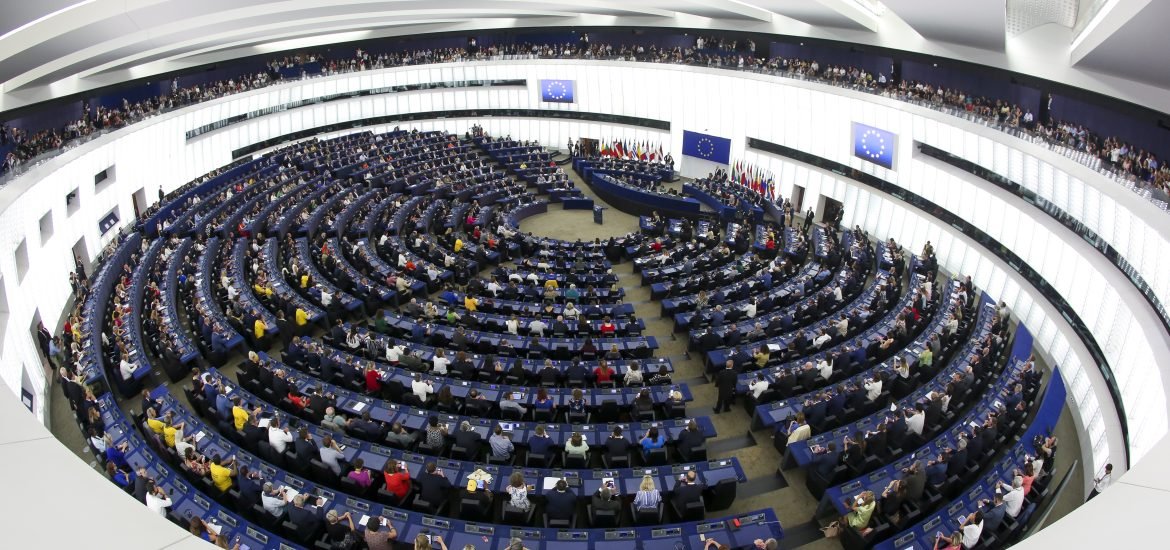
The European Parliament (EP) is split on whether or not to pass a resolution today that would declare a global climate emergency before a critical UN summit next week.
The draft resolution declares “an environment and climate emergency in Europe and globally,” and pledges that the European Union (EU) will take action as such. If passed, the resolution would no doubt ratchet up pressure on incoming EU leaders, like Commission president-elect Ursula von der Leyen, to take radical action to address climate change.
In a separate vote, the EP is set to approve a resolution declaring that current EU climate targets are “not in line” with the 2015 Paris Agreement. The multilateral climate deal commits to keeping global temperature rises “well below” 2C above pre-industrial levels, ultimately aiming for a no more than 1.5C rise. Global progress on this benchmark is far from encouraging.
“Our collective failure to act early and hard on climate change means we now must deliver deep cuts to emissions- over 7% each year, if we break it down evenly over the next decade,” claims Inger Anderson, executive director of the UN Environment Programme (UNEP).
The EP’s decision comes ahead of the critical COP25 summit in Madrid next week, where UN negotiators are under pressure to drastically upgrade emission reduction expectations. Moreover, the release of a bleak UNEP report two days ago has lit a fire under global leaders: according to the UN, emissions have increased by 1.5% annually over the past ten years, and the planet is now on course to endure a temperature rise of 3.2C by the end of the 21st century.
Despite having consistently stressed the importance of keeping emissions low, the EU is under fire for not investing sufficiently in building a climate change strategy. According to the European Investment Bank (EIB), the EU invested 1.2% of its GDP, or $174 billion, in climate change measures last year; the US managed to invest 1.3% of GDP, while China dwarfed both at 3.3%.
As such, the EIB has called for financing to increase by one third if Europe is to have a net-zero emissions economy by 2050. The bloc’s stronger economies have accordingly been advised to front load investment as much as possible through increased borrowing. “After a lost decade of weak investment,” declared the EIB’s vice-president Andrew McDowell, “we need to tackle the slowdown now if we are to respond to the historic challenges we are facing.”
Today’s EP vote also follows the release of an important survey carried out by Ipsos and French electric utility EDF. As part of the survey, some 24,000 citizens across 30 countries were polled about their concern for the current environmental situation; encouragingly, only 8% of respondents were ignorant of the climate change issue or denied its existence.
Climate change doubters, says the Ipsos-EDF survey, tend to be those living in major fossil fuel exporting countries. In Australia, the world’s fourth largest producer of coal, some 45% of respondents denied any coming crisis; disbelievers in OPEC member Norway amounted to 49% of those polled by Ipsos for EDF. In Saudi Arabia, the largest oil producer in the world, 59% of respondents believed climate change to be non-existent, or at least independent from human activity.
The picture in Europe, however, is a different story altogether: according to the survey by Ipsos and EDF, 70% of French respondents said they felt negatively about their country’s environmental situation, and less than a quarter of them considered government actions to be useful so far. In Italy, barely one fifth of respondents showed confidence in their authorities’ efforts, indicating that European governments have a way to go in their attempts to tackle climate change to live up to their citizens’ expectations.
The Ipsos-EDF survey also highlighted the need for people to radically change their lifestyles in order to address worsening climate change; more than half of respondents agreed with this sentiment. The perception of individual responsibility is backed by recent research, which indicates that an “upheaval” is necessary in order to meet international and national targets.
According to researchers from Imperial College London, 30% of a British household’s carbon footprint is accounted for by dietary choices; collective shifts from higher-carbon and resource intensive foods, like red meat and dairy, toward plant-based diets is a vital preliminary step. The UK government’s Committee on Climate Change has even called for mandatory carbon impact labelling on products, receipts and online shopping platforms. Nonetheless, calls for individual action by no means absolve governments and big business of sweeping structural changes. Rather, climate advocates must model sustainability while still demanding systemic shifts.
The EP vote today is the canary in the coalmine of political motivation in the region. Von der Leyen can pledge to mainstream climate financing and a transition to a zero-emissions economy until the day she leaves office, but her words are meaningless without tangible government action at a domestic, regional and international level.
Meanwhile, each year of delay pushes the planet ever closer to disaster. If emissions keep rising between now and 2025, climate researcher Anne Olhoff predicts that annual emissions cuts of 15.7% would be necessary to stay under the 1.5C ceiling. Even then, it would almost certainly be too late. As the Ipsos-EDF survey emphasized, we must radically change our lifestyles in order to prevent a climate emergency.